Chief’s message:
This week we have highlights around some work our heart failure and transplant teams are doing around a total artificial heart. The story ran on NBC news this last week and builds on work this group has done over the last several years around supporting people with failing hearts. Moreover, it highlights the tremendous teamwork with the cardiologists, CT surgeons, cardiac anesthesiologists, the research teams, ICU, wards, and overall care teams to help patients move through our system to get innovative therapies. We have examples across all of our disciplines for patients we care for in cardiometabolic prevention, arrhythmia care, heart failure, coronary and vascular care, and valvular heart disease. Thanks to the teams that helped this latest innovation get to our patients.
On a more solemn note, we also have information below around one of our past cardiology fellows, now cardiologist in practice passing away suddenly – Rip Waters. Our community grieves the loss of such a kind and thoughtful person. Details of the memorial and places for donation are provided below. We will keep Rip and his family in our collective thoughts and prayers.
Highlights and Updates of the week:
Duke Transplant Team Helps Pioneer Total Artificial Heart
A young Graham, NC, father became the second person in the world to receive a BiVACOR Total Artificial Heart (TAH) as a bridge to transplant, living with the device for 10 days before undergoing a heart transplant at Duke University Hospital.
 The device completely replaces a patient’s heart muscle, providing the essential mechanics to circulate blood throughout the body. For patients with biventricular heart failure awaiting a heart transplant, the device provides blood circulation until a donor heart becomes available.
The device completely replaces a patient’s heart muscle, providing the essential mechanics to circulate blood throughout the body. For patients with biventricular heart failure awaiting a heart transplant, the device provides blood circulation until a donor heart becomes available.
Use of the device at Duke was part of a first-in-human clinical study aiming to evaluate the safety and performance of the BiVACOR TAH. The device provides an option for eligible patients with severe biventricular heart failure or univentricular heart failure in which left ventricular assist device support is not recommended.
“While there are many ways to bridge patients with end-stage heart failure as they await heart transplant, all conventional strategies were unsuccessful for our patient, who had dysfunction of both the right and left side of the heart,” said Duke transplant surgeon Carmelo Milano, MD, chief of the Division of Cardiothoracic Surgery. “The BiVACOR TAH effectively replaced his entire heart and restored normal circulation. He was able to be successfully transplanted 10 days later.”
The Duke patient is a 34-year-old education consultant who is expecting his fourth child. Donavan Harbison, a recreational runner and former NC Central University football player, began feeling poorly in late 2023 and thought he had pneumonia.
To his surprise, he was diagnosed with heart failure.
“It was shocking,” said his wife, Lindsey Harbison. Hoping to manage the condition with medications along with diet and lifestyle changes, Harbison learned earlier this spring his condition was genetic and likely the cause of his father’s early death.
After further tests, his doctors at Cone Health in Greensboro, Daniel R. Bensimhon, MD, and Aditya Sabharwal, DO, found that he had end-stage biventricular heart failure and referred him to Duke for a heart transplant.
“We can offer our patients VADs, ECMO, and other technologies, but the ability to offer our patients the very highest level of care, such as heart and dual-organ transplant, as well as access to advanced devices such as the BiVACOR TAH — that does not happen unless you’re aligned with a partner like Duke Health,” Bensimhon said. “It allows us to get our patients super high-level therapies, fairly close to home, that they would not have access to otherwise.”
With his condition deteriorating quickly, Harbison received a ventricular assist device, but it could not provide the level of assistance needed. After ruling out other technologies, Harbison and his Duke team opted to move forward with the artificial heart.
“There was definitely a feeling of the fear of the unknown,” Donavon Harbison said, “but at that point, I had resolved to take the leap of faith and do everything I could do to increase the success of what would happen.”
“Now, I’m looking forward to getting back to making memories with my family, my kids, my wife, just doing the things you often do and take for granted, like putting my kids to bed at night.”
Harbison received the BiVACOR device in early August – the second in the world after the first implantation occurred at Texas Heart Institute a few weeks earlier. With the device providing strong blood circulation, Harbison gained enough strength within 10 days to receive a donated heart.
“Many end-stage heart disease patients are actually too sick to qualify for heart transplants,” said heart surgeon Jacob Schroder, MD, surgical director of Advanced Heart Failure at Duke and a member of the transplant team that implanted the device. “Current technologies are effective for some patients, but still leave others without options. Having another way to bridge a path to transplant would fill a tremendous void and truly be a lifesaver.”
The BiVACOR TAH utilizes an electro-mechanical rotary blood pump that is a simpler construction than other investigational devices. It has no valves, and a motor drives a single magnetically levitated rotor that simultaneously pumps blood to both the body and the lungs.
“It was a remarkable opportunity for our team to witness the recovery and subsequent bridge-to-transplant of our second courageous BiVACOR TAH patient at Duke,” said Daniel Timms, Ph.D., founder and chief technology officer of BiVACOR. “He and his family embraced a positive attitude toward this new technology, which not only helped extend their lives together, but their experience will provide hope for many others with end-stage heart failure.”
The BiVACOR device is the second total artificial heart implanted via clinical trial at Duke. In 2021, the heart transplant team became the first in the world to successfully implant a different technology, manufactured by CARMAT.
The Duke heart transplant team has been a world leader in pioneering new technologies that make heart transplantation accessible to more patients,” said Adam DeVore, MD, medical director of the Duke Heart Transplant program. “With long waiting lists for the limited numbers of donor hearts, it’s imperative that we continue to find innovative ways to maximize scarce resources.”
The BiVACOR Total Artificial Heart Early Feasibility Study is led nationally by cardiologist and Principal Investigator Joseph G. Rogers, MD, president and CEO of Texas Heart Institute in Houston. Rogers spent many years with us at Duke and remains an adjunct professor of medicine in cardiology at Duke School of Medicine. He served as interim chair of the Duke Department of Medicine for just over a year before being named Chief Medical Officer for DUHS in 2018. He joined THI in 2021.
“It has been rewarding to watch the evolution of this pump and see it finally get to human trials,” said Rogers. The BiVACOR device has been in development and preclinical testing with Texas Heart Institute for nearly 12 years, he added. “We’ve watched the device transition from very early prototypes to pre-clinical testing, and finally to human implant.
Rogers says the field has always needed a reliable, total artificial heart. “So many of the patients we care for can get by with a left ventricular assist device because their right hearts work reasonably well, but there is a cohort of patients who, heretofore, had no real viable therapy. I think this device offers that patient population promise and hope that we finally have a total artificial heart that will be not just an outstanding blood pump, but a reliable device that could support people for prolonged periods.”
In terms of collaborating with investigators at Duke on the trial, Rogers said, “You can’t ignore the Duke Heart Failure program for any clinical trial conducted in the U.S. It’s the top-tier program with high-volumes, outstanding care, and a team committed to clinical research and excellence. Duke now has the largest advanced heart failure program in the U.S., and probably in the world. It is also arguably the most academically impactful and has trained some of the most brilliant minds in heart failure in the last 15 years.”
Further reflecting on Duke’s HF program, Rogers adds, “It has been fulfilling to look back at the program and see just how remarkable it is. The physicians and surgeons who are leading it are taking it places that we never would have even dreamed it could go.”
Incredible work, team!
In Memoriam: Rip Waters, MD, former Duke CV Fellow
We learned this week of the passing of cardiologist Richard Everely Waters, II, MD, a former cardiovascular fellow at Duke, on Sept. 24 in California. He was 53.
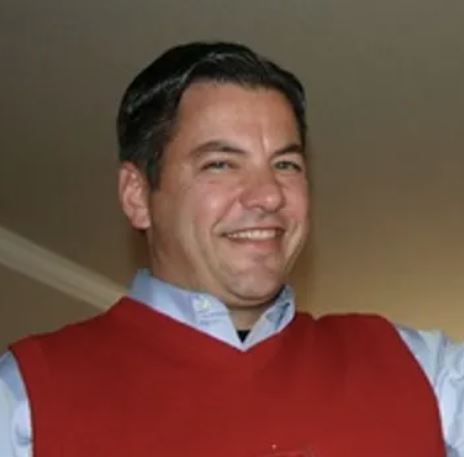 He is survived by his wife Erica, and their children Ella (20) and Reed (19). He is also survived by his mother, Joanne Waters, brothers Robert (Sara) Waters and Randall (Janée) Waters, sister-in-law Lindsay (Scott) Horner, nieces and nephews Tucker, Claire, Kellen, Isabella, Alexandre, Grant, and Gavin, and parents-in-law, Leon and Denise Reed. He was preceded in death by his beloved father and namesake, Richard E. Waters.
He is survived by his wife Erica, and their children Ella (20) and Reed (19). He is also survived by his mother, Joanne Waters, brothers Robert (Sara) Waters and Randall (Janée) Waters, sister-in-law Lindsay (Scott) Horner, nieces and nephews Tucker, Claire, Kellen, Isabella, Alexandre, Grant, and Gavin, and parents-in-law, Leon and Denise Reed. He was preceded in death by his beloved father and namesake, Richard E. Waters.
Though Rip valued his job as a cardiologist, his most cherished and gifted roles were as a husband, father, son, brother, and friend.
His obituary reads, in part:
Rip was a brilliant student, and continued his academic pursuits, seeking excellence at all times. He graduated from Stanford in 1993 with a BA in Economics. After college, he spent a year traveling and serving as a medical volunteer in Peru, then continued on to Vanderbilt Medical School, receiving his MD in 1998. He completed internal medicine residency at Johns Hopkins Hospital in 2001, and cardiovascular fellowship at Duke University Hospital in 2005. After completing his training, he returned home to Stockton, where he sought to always provide outstanding cardiology care to the community. He joined Stockton Cardiology Medical Group in 2005 and was a partner there for the remainder of his career. He was a dedicated clinician and loved to hear every person’s story. He also worked at St. Joseph’s Hospital, where he served in many leadership roles. He was most proud of being part of the structural heart team, which brought non-invasive heart valve replacement (TAVR) to Stockton.
The full memorial piece can be found here.
“Rip Waters left a legacy of always being kind to patients, colleagues, staff, and students,” said Anna Lisa Chamis, MD, program director of Duke’s Cardiovascular Disease Fellowship. “I try to pass on his legacy to our fellows to always be kind even when frustrated in a given situation.”
Chamis and several other cardiology faculty members trained with Waters at Duke during fellowship and became good friends with him. We know Rip will be deeply missed by all who knew and loved him. Our deepest sympathy goes out to his family, friends and colleagues.
Private family services were held at Cherokee Memorial Park in Lodi. A Celebration of Rip’s Life will be held at a later date.
In lieu of flowers, donations may be made to the San Joaquin Medical Society Scholarship Loan Fund, 3031 W. March Lane, suite 222W, Stockton CA 59219, or the charity of your choice.
Cardiac Imaging Symposium Held
 The Duke Cardiac Imaging Symposium was held yesterday, October 12 in the Great Hall of the Trent Semans Center.
The Duke Cardiac Imaging Symposium was held yesterday, October 12 in the Great Hall of the Trent Semans Center.
The event, designed for cardiac sonographers, imaging cardiologists, and other healthcare professionals involved in cardiovascular imaging, had more than 90 participants attending either virtually or in person. Ten companies joined us as vendors.
The event had terrific lectures as well as hands-on demonstrations conducted in small breakout sessions for participants.
Co-course directors were Drs. Anita Kelsey and Sreekanth Vemulapalli. Invited presenters included Fawaz Alenezi, Alicia Armour, Ashlee Davis, Andy Dhimitri, Dallas Gardner, Sarah Hatton, Michel Khouri, Batina Kight, Christopher Kontos, Jayne Leypoldt, Nicholas Medlock, Rachel O’Brien, Jon Owensby, Richard Palma, Danny Rivera, Eddy Sandoval, and Andrew Wang.


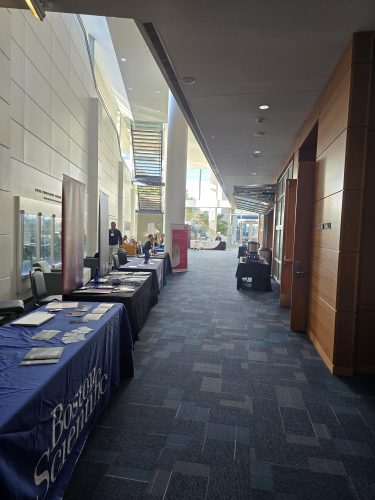
Shown here, L-R, are Alenezi, Palma, Sreek Vemulapalli, Ashlee Davis, Alicia Armour, and Anita Kelsey.
Nicely done, all!
Duke Health Baxter IV Fluid Update
On behalf of our Heart & Vascular leadership, kudos to all team members for your ongoing and amazing efforts within our clinical areas to ensure excellent care and conservation of supplies during the Baxter shortage.
Here’s the latest:
As Duke Health continues to monitor the impact of the Baxter Healthcare manufacturing plant closure, we would like to express heartfelt thanks to everyone who is working so tirelessly to review our processes to develop and implement conservation strategies. Your efforts are enabling us to protect our supply of these critical fluids while continuing to provide safe, quality care for our patients.
Thanks to our ongoing conservation efforts, our supply of critical fluids appeared sufficient going into the weekend. Please take note of the following:
- The DUH incident command center will be open from 9 a.m. – 1 p.m. on Saturday and Sunday. To contact the command center, call 919-684-2222.
- To order IV fluids, call the Fluid Distribution Center at 919-681-6851. The center remains open 24/7.
- If you use emergency stock, please call the fluid center to have your emergency supply replenished.
- When returning Code Carts to the pharmacy, please be sure to also return all IV fluids that were not used for patient care.
- For Duke North and DMP ORs: please put aside empty Baxter 1000 ml bottles of sterile water for Irrigation and 0.9% Sodium Chloride for Irrigation with the cap on the cart at the DMP OR Front Desk.
- For procedural areas: DUH is tentatively planning to transition to distilled water for GI endoscopy procedures starting on Tuesday, October 15. Infection Prevention is finalizing the SOP for collection, cleaning, and filling bottles with distilled water. Other DUHS GI endoscopy sites should review the SOP this weekend and determine readiness for transition on Monday. Supply Chain has obtained enough distilled water to support this process for all GI endoscopy across the system. DUH is also collecting used bottles of the Baxter 1000 ml bottles of Sterile water for Irrigation and 0.9% Sodium Chloride for Irrigation with the cap in preparation for this change.
- Please ensure that we continue to follow all previously communicated conservation strategies.
Please note this update from late last week regarding warmer storage for irrigation solutions in OR/Procedural settings:
- Irrigation solutions in plastic pour bottles may be stored in the warmer for up to 28 days. Use-by dates for these solutions may be extended from 14 days to up to 28 days total.
Thank you again for your collaboration and dedication throughout this situation.
UHC Negotiations Update
For several months, Duke University Health System leadership has worked diligently to negotiate a new agreement with UnitedHealthcare (United) that protects our patients’ access to Duke Health and appropriately reimburses us. However, United has yet to agree to such terms and is likely to remove Duke Health from its network on October 31, 2024. If this occurs, patients with UnitedHealthcare insurance will have to pay more out of pocket to access care at Duke Health beginning November 1, 2024.
Significant operational planning is underway to minimize disruption to patients and clinical teams in the event that this occurs. For now, teams and clinicians should continue care as usual. Resources for Duke Health teams, including leader talking points and team member tips, as well as patient resources, can be found in this email message that was shared earlier in the week. Information is also available on Leadership Exchange.
DUHS has posted a publicly available statement regarding our ongoing negotiations with UnitedHealthcare (UHC). It can be found on the DUHS News & Media site. Here is the link.
Campbell To Serve in ACC Sessions Planning Role
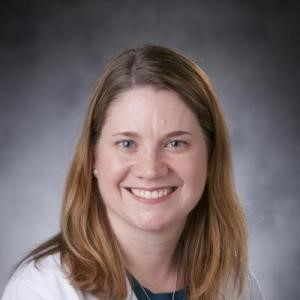 Congratulations to Kristin Bova Campbell, clinical pharmacy specialist in electrophysiology at Duke! We learned this week that she will serve as the Cardiovascular Team Lead for the American College of Cardiology Annual Scientific Sessions for both 2026 and 2027.
Congratulations to Kristin Bova Campbell, clinical pharmacy specialist in electrophysiology at Duke! We learned this week that she will serve as the Cardiovascular Team Lead for the American College of Cardiology Annual Scientific Sessions for both 2026 and 2027.
The CV Team Lead works closely with the chair, vice chair, and other team leads to direct and manage the work of the Annual Scientific Session Program Committee, focusing on areas of the meeting related to CV Team member education and the role of the CV Team in patient care.
What a huge honor — congrats, Kristin!!
Great Catch, Watts!
Katland Watts, CNII, a team member with our Cardiac Intensive Care Unit at Duke University Hospital earned a Great Catch Award recently, which was presented to her on Monday, October 7:
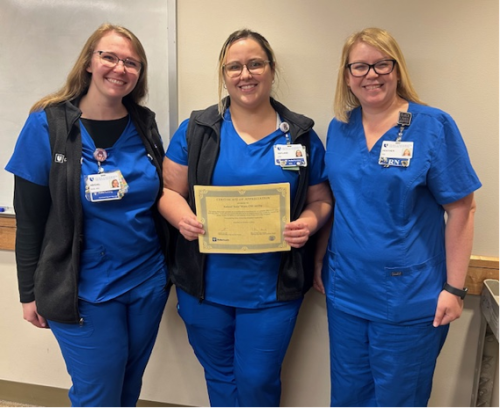 Cardiac ICU Nursing colleague, Katland (Katie) Watts, received an order for Digoxin to treat a persistent/complex patient condition. Katie reviewed the labs prior to administering the medication and found electrolyte imbalances that made her question the appropriateness of this medication. She recalled learning in nursing school less than two years ago some concern regarding Digoxin and potassium levels and took the extra step to both research the drug and contraindications AND call the primary team for clarification. Based on current potassium and magnesium levels, the primary team agreed administration of this drug could result in potential harm or toxicity. The order was held until further assessment and planning for safe management could occur. Because of Katie’s clinical expertise and meticulous practice, she prevented harm from reaching the patient.
Cardiac ICU Nursing colleague, Katland (Katie) Watts, received an order for Digoxin to treat a persistent/complex patient condition. Katie reviewed the labs prior to administering the medication and found electrolyte imbalances that made her question the appropriateness of this medication. She recalled learning in nursing school less than two years ago some concern regarding Digoxin and potassium levels and took the extra step to both research the drug and contraindications AND call the primary team for clarification. Based on current potassium and magnesium levels, the primary team agreed administration of this drug could result in potential harm or toxicity. The order was held until further assessment and planning for safe management could occur. Because of Katie’s clinical expertise and meticulous practice, she prevented harm from reaching the patient.
Way to go, Katie!
Open Enrollment Starts Monday
Open enrollment is your opportunity to review your medical, dental, vision, and reimbursement account benefit elections and make any changes necessary to ensure your choices continue to meet your needs.
If you wish to participate in the Health Care or Dependent Care Reimbursement Accounts for 2025, you must enroll (or re-enroll). Participation in the reimbursement accounts does not automatically continue from year to year.
If you do not make changes to your medical, dental or vision coverage, your current medical, dental and vision coverage elections for 2024 will continue for 2025.
Duke’s annual open enrollment period for medical, dental, vision and reimbursement account benefits for 2025 is from October 14 at 8 a.m. — October 25 at 6 p.m.
- Up to $640 of your unused Health Care and Dependent Care Reimbursement Account funds from 2025 can be carried over to the subsequent year.
- All selections made during the open enrollment period will be effective January 2025.
Benefits information has been mailed to all staff. All information can also be found on Duke’s Open Enrollment 2025 website.
Early Voting at Karsh Starts on Thursday
Durham County registered voters can vote early at Karsh Alumni Center starting Thursday, October 17, and ending Saturday, November 2.
Hours are as follows:
- Monday – Saturday: 8 a.m. – 7:30 p.m.
- Sundays: 2 p.m. – 7:30 p.m.
- 2: 8 a.m. – 3 p.m.
Same-day voter registration will also be available during this time.
Duke Health Hurricane Helene Relief Efforts
Duke Health continues to support Hurricane Helene relief efforts in Western North Carolina.
“In support of the huge need for disaster relief, the health system has donated a wide variety of much-needed supplies, personnel, and drugs to our neighbors and colleagues to the west,” said Craig Albanese, MD, MBA, CEO of DUHS, in a statement last week to all employees. “I’m so proud that more than 300 of our team members have volunteered to deploy to provide clinical and non-clinical support where needed. Additionally, many of our team members have donated their time and expertise locally, and thousands of dollars have been raised through various fundraising efforts. If you are interested and able to do so, please click here to contribute to the American Red Cross. However you are able to support relief efforts, know it will go a long way and truly make a difference.”
You can join our support efforts in many ways:
- Sign up to volunteer with our SMAT team to deploy to provide disaster relief.
- Make a financial donation to the American Red Cross.
- Check for updates on this Duke Health intranet page (NET ID required)
Upcoming Events & Opportunities
Sept. 15 to Oct. 15: Hispanic Heritage Month
Oct. 17-Nov. 2: Early voting period, November 2024 General Election.
Oct. 20-Oct.26: Respiratory Care Week
Cardiology Grand Rounds
Oct. 15: Mechanical Circulatory Support in Cardiogenic Shock: Where Interventional and Heart Failure Collide with Imran Aslam, MD. 5 p.m. Zoom only.
All Duke Cardiology Grand Rounds recordings are housed on Warpwire. To access recordings please visit:
NET ID and password are required. Enjoy!
CD Fellows Core Curriculum Conference
October 16: No conference. Interview Day.
October 18: Fellows’ Meet and Greet Lunch with visiting professor Bernard Gersh. Noon, DMP 2W91
October 23: HF/Txp Fellows’ Case Conference with Mike Cosiano. Noon, DMP 2W96
October 25: No conference. Interview Day.
October 30: Board Review with Paula Rambarat and Nishant Shah. Noon, DN 2001
Duke Heart Fall 2024 CME Courses
Upcoming symposia:
November 1: the 16th Annual NC Research Triangle Pulmonary Hypertension Symposium at Durham Convention Center, 8:00 a.m. to 3:15 p.m. Course directors are Dr. Terry Fortin and Dr. Jimmy Ford (of UNC).
Questions? Contact Christy Darnell.
DIHI – Innovation Projects RFA 2025
The Duke Institute for Health Innovation (DIHI) announces the next emerging ideas and innovation funding cycle. Applications are open to faculty, staff, trainees, and students of Duke University and Duke University Health System. Proposed innovation projects should address actual and important problems encountered by care providers, patients, and their loved ones in our clinical enterprise and represent urgent health challenges nationally.

For the 2025 funding cycle, priority will be given to ideas aligned with the thematic area of improving provider and staff experience, the patient journey, and clinical outcomes using advanced technology solutions.
Due Date: Proposals are due by 11:59 p.m., October 25, 2024.
Application packet can be found here.
Up to ten applications will be selected for support. Most proposals are expected to request funding in the range of $25,000 to $60,000 over a one-year period.
Questions? Please email DIHIrfa@duke.edu.
Call for Nominations: MLK Humanitarian Award
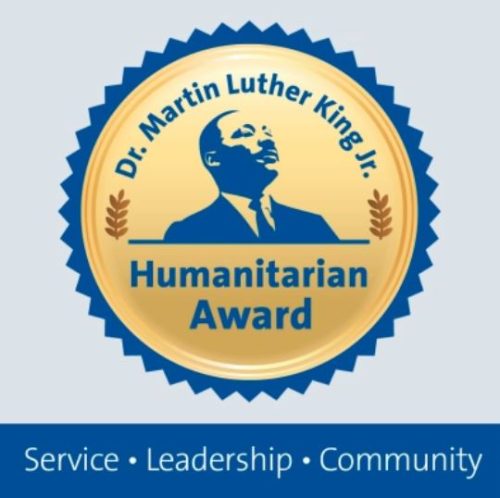 Nominations are now open for Duke’s first Dr. Martin Luther King, Jr. Humanitarian Award. This initiative is inspired by Dr. King’s enduring legacy and will celebrate Duke Health faculty and staff who embody his vision of “It starts with me…” The award will honor those who have gone above and beyond in their dedication to a nonprofit’s mission in keeping with the principles of Dr. King.
Nominations are now open for Duke’s first Dr. Martin Luther King, Jr. Humanitarian Award. This initiative is inspired by Dr. King’s enduring legacy and will celebrate Duke Health faculty and staff who embody his vision of “It starts with me…” The award will honor those who have gone above and beyond in their dedication to a nonprofit’s mission in keeping with the principles of Dr. King.
Nominations will be accepted through October 29. The awards will be announced during Duke’s annual recognition of the MLK holiday in January.
Learn more about the award here.
SOM Leadership Development Programs Update
Applications for the 2025 SOM Leadership Development Programs are now open. This includes the ADVANCE-UP, ALICE, DCLP, and LEADER programs.
Applications are due by Friday, Nov. 1. To learn more, click here. Programs are hosted by the SOM Office for Faculty.
Have news to share?
If you have news to share with the Pulse readership contact Tracey Koepke, director of communications for Duke Heart & Vascular at tracey.koepke@duke.edu. We would love to hear about your latest accomplishments, professional news, cool happenings, and any events or opportunities that may be of interest to our team. Please call with any questions: 919-681-2868. Feedback on Pulse is welcome and encouraged. Submissions by Noon on Wednesdays will be considered for weekend inclusion.
Duke Heart in the News:
October 4 — Theresa Fink/Duke Lifepoint, Conemaugh
Becker’s Hospital Review
Duke LifePoint names physician group COO
October 4 — Annemarie Thompson
Renal & Urology News
AHA and ACC Update Cardiovascular Management Guideline for Noncardiac Surgery
October 5 — Duke Health
Times of India
These signs of a heart attack can appear in young , super-fit people weeks before
October 5 — Robert Mentz
European Heart Journal & Podcast
New light shed on the treatment of heart failure and on novel therapeutic targets
EHJ podcasts are located here: https://duke.is/v/qhfm
October 6 — Gregory Pauly
Yahoo News/McClatchy/Charlotte Observer
Hospitals brace for IV, dialysis fluid shortages after Helene shuts down NC producer
October 7 — Adam DeVore, Carmelo Milano, Donovan Harbison
NBC News Now
‘My heart was gone’: Second person to receive a titanium heart shares experience
October 8 — Leanna Ross
News & Observer* (via AHA News)
‘Weekend warriors’ may gain same health benefits as people who spread out exercise
*and 30 McClatchy news affiliates
October 8 — Duke Children’s
US News & World Report
U.S. News Announces the 2024-2025 Best Children’s Hospitals
October 8 — Duke Children’s (peds cardiology/CT Surgery)
WNCN-TV (Raleigh/CBS News)
Duke Children’s Ranked Highly for Pediatric Cardiology, Heart Surgery
October 8 — Duke Children’s (peds cardiology/CT Surgery)
Cardiovascular Business
The top 25 children’s heart hospitals in the US
October 8 — Duke Children’s Hospital (peds cardiology/CT Surgery)
State children’s hospitals earn top rankings
WGHP-TV (Greensboro-High Point, NC)
October 8 — BiVACOR/Duke Heart
Black News/Radio Zindagi (NYC)
Experimental Artificial Heart Helps Save Life
October 8 — Adam DeVore, Carmelo Milano, Donavon Harbison
WRAL-TV (Raleigh)
NC father embraces new life after becoming 2nd person to receive titanium heart at Duke Hospital
October 8 — Adam DeVore, Donavon Harbison
WTVD-TV (Durham)
Graham resident, former NCCU football player becomes 2nd in world to receive total artificial heart
October 8 — Carmelo Milano, Donavon Harbison
WXII-TV (Winston-Salem, NC)
October 8 — Carmelo Milano, Donavon Harbison
WNCT-TV (Greenville, NC)
NC home to innovative heart transplant
October 8 — Adam DeVore, Carmelo Milano, Donavon Harbison
WCNC-TV (Charlotte)
NC father becomes second person to receive titanium heart at Duke hospital
October 8 — Adam DeVore, Carmelo Milano, Donavon Harbison
NBC News Daily (and NBC affiliates nationally)
Heart transplant innovation helps NC man’s recovery
October 8 — Carmelo Milano, Donavon Harbison
WRC-TV (Washington, DC)
Heart transplant innovation aides man’s recovery
October 9 — Crystal Tyson
Best Life
Doctors Say This Heart-Healthy Diet Is “The Way to Go” for Lower Blood Pressure
October 9 — Carmelo Milano, Jacob Schroder, Adam DeVore
Duke Today
Duke Transplant Team Helps Pioneer Total Artificial Heart
October 9 — Jeffrey Kuller (OB/GYN)
Juta Medical Brief (Africa)
Heart defect risk for babies conceived through IVF – Swedish study
October 10 — Donovan Harbison/BiVACOR
WSOC-TV (Charlotte, NC)
Artificial Heart helps North Carolina man bridge gap until heart transplant
October 10 — Harry Severance
Becker’s ASC Review
Are business skills the ticket to reclaiming physician autonomy?
October 10 — Sana Al-Khatib
Healio/Cardiology Today
VIDEO: ‘Clear lack of data’ on digital CV health tools for women concerning
October 10 — Carmelo Milano and Donovan Harbison
WNYT-TV (Albany, NY)
October 10 — Carmelo Milano and Donovan Harbison
WPTF-AM (Raleigh, NC)
Duke uses innovative device to bridge patient from heart failure to heart transplant
October 10 — Mark Kittipibul and Robert Mentz
Renal & Urology News
Semaglutide Lowers Heart Failure Risks in Patients With Type 2 Diabetes, CKD
October 10 — Marat Fudim
Medical Dialogues (India)
October 11 — Marat Fudim
Healio/Cardiology Today
New consensus statement outlines benefits, challenges of device-based therapies for HF
Recent Comments